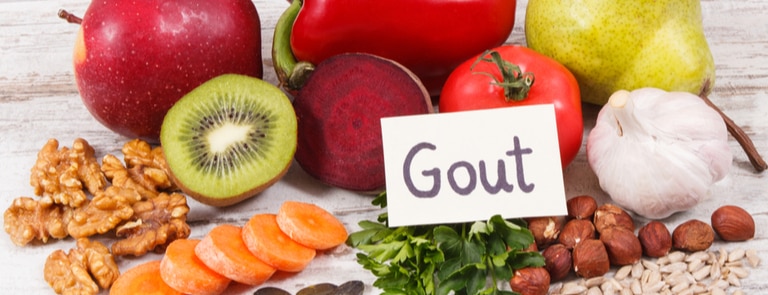10% off £35
11 low purine foods to avoid gout flare-ups

As the most common form of inflammatory arthritis worldwide, gout can be debilitating and distressing for those living with the disease.
If you are living with gout then don’t worry, you are not alone. The UK Gout Society reports that one in 14 men and one in 35 women are affected by gout.1
In order to treat gout, you have most probably been prescribed medication as a preventative measure.
However, in this article, we are looking at further ways you can go by looking at your diet and ways you can manage your intake of purines to avoid flare-ups.
Handpicked content: Gout: Causes, treatment & prevention
What are purines?
As you may know, gout is caused by an elevated level of uric acid in the blood.
Uric acid is a chemical produced by the body when it breaks down a substance in the blood called purine.
Uric acid is present in the body naturally and does not cause issues at normal levels.
However, elevation can happen as a result of eating too many foods and drinks high in purines.
It is impossible to cut purines out of your diet altogether, although there are certainly ways you can manage your diet so you lessen your purine intake.2
Purines and gout - why should you avoid eating purines if you have gout?
Purines contain uric acid, which is what causes gout. To avoid ‘flare-ups’ you should try and avoid foods that are high in purines.
Purines vs pyrimidines
When it comes identifying the main differences between purines and pyrimidines, what you’ll want to remember is the ‘three S’s’: Structure, Size, and Source.
The very basics of what you need to know are in the table below, but you can find more details about each one further down.
| Purines | Pyrimidines | |
|---|---|---|
| Structure | Double carbon-nitrogen ring with four nitrogen atoms | Single carbon-nitrogen ring with two nitrogen atoms |
| Size | Bigger | Smaller |
| Source | Adenine and Guanine in both DNA and RNA | Cytosine in both DNA and RNA Uracil only in RNA Thymine only in DNA |
8 foods high and rich in purine
Purines are present in many different foods, which makes them hard to avoid.
However, foods that contain high amount of purines can easily be avoided, they include.3
- All alcohol
- Some seafood and shellfish, including anchovies, sardines, herring, mussels, codfish, scallops, trout and haddock
- Meats, such as bacon, turkey, veal and venison
- Organ meats (like liver and kidney)
- Soybeans
- Vegetables such as cauliflower, asparagus and mushrooms.
Foods with moderate purine levels include:
- Meats, such as beef, chicken, duck, pork and ham
- Shellfish, such as crab, lobster, oysters and shrimp
The fact that a food contains purine does not automatically make it off-limits to you, so don’t worry as the benefits of these healthy foods outweigh the dangers posed by their purine levels.
It is not recommended that you cut out healthy foods such as vegetables, although the UK Gout Society advises you to avoid foods particularly rich in purines such as red meat, organ meats and shellfish, as well as beverages such as beer.4
11 foods low in purines
While they can be hard to avoid, there are some foods that you can eat more freely than others.
These include:5
- Milk
- Yogurts
- Cheese
- Dairy-free alternatives, such as soya products
- Eggs
- Fruit and vegetables
- Bread
- Cereals
- Pasta
- Rice
- Noodles
Poultry, red meat and fish may also be eaten in moderation if you so wish.
Drinks high and rich in purines
Obviously, alcohol is a big no-no here as it contains more purines than any other food.
However, you should consider that sugar-sweetened drinks, such as full sugar soft drinks or fortified juices (additional sweeteners such as fructose, fructose corn syrup or cane sugar) including freshly pressed juices or smoothies may increase the amount of uric acid in the body, which can lead to a gout flare-up.
Drinks low in purines
Instead, you should try to drink water, tea or coffee, without sugar.
Avoid drinking soft and fizzy drinks in your diet for the best results.
Handpicked content: 11 of the healthiest drinks - including recipes
What should I be eating?
A diet rich in fruit, vegetables, and pulses.
A study from 2012 has linked the consumption of cherries to a decreased risk of gout flare-ups, so feel free to enjoy lots of this healthy fruit.6
Diet can help with the symptoms of gout, but unfortunately cannot totally eradicate flare-ups.
Maintaining a healthy weight is key, as being overweight increases the risk of frequent gout attacks.
Also, limiting your consumption of beers and spirits is recommended as these are major co-existing risk factors for those with gout.7,8
Do not crash diet as this can cause uric acid retention.
Drinking plenty of water, at least 2 litres a day, will help.
Nettle tea also has the added benefit of having mild diuretic effects and so can help flush out uric acid from the system.
What else treats gout?
Your GP will probably prescribe a urate-lowering medicine and might prescribe you vitamin C supplements. It is important to follow your doctor’s advice as each case is different.
Last updated: 23 September 2021s
- http://www.ukgoutsociety.org/all_about_gout.htm.
- https://www.arthritis.org/health-wellness/healthy-living/nutrition/healthy-eating/which-foods-are-safe-for-gout
- https://www.arthritis.org/health-wellness/healthy-living/nutrition/healthy-eating/which-foods-are-safe-for-gout
- https://www.ncbi.nlm.nih.gov/pubmed/25591183
- https://www.ouh.nhs.uk/patient-guide/leaflets/files/44690Pgout.pdf
- https://www.ncbi.nlm.nih.gov/pubmed/23023818.
- https://www.ncbi.nlm.nih.gov/pubmed/25603588.
- https://www.ncbi.nlm.nih.gov/pubmed/25591183














